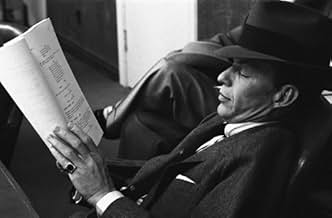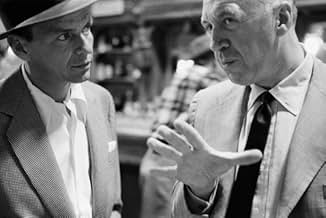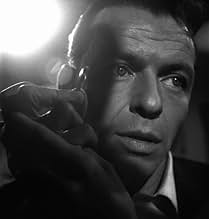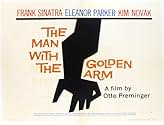IMDb RATING
7.3/10
13K
YOUR RATING
A junkie must face his true self to kick his drug addiction.A junkie must face his true self to kick his drug addiction.A junkie must face his true self to kick his drug addiction.
- Nominated for 3 Oscars
- 3 wins & 8 nominations total
Jered Barclay
- Junkie in Lock-Up
- (uncredited)
Leonard Bremen
- Cabbie in Lock-Up
- (uncredited)
Paul E. Burns
- Suspenders in Lock-Up
- (uncredited)
Pete Candoli
- Jazz Musician
- (uncredited)
Herschel Graham
- Club Safari Patron
- (uncredited)
Harold 'Tommy' Hart
- Officer Kvorka
- (uncredited)
Featured reviews
This great movie brought out into the open the horrors of heroin addiction. It captured the struggle of a man, Frankie Machine, with a "monkey on his back". Frank Sinatra did his homework, well. The acting is superb, the score is first rate and the actors all gave above average performances. Frank gave one of his best performances. This movie has much to offer.
A strung-out junkie (Frank Sinatra) deals with daily demoralizing drug addiction while crippled wife (Eleanor Parker) and card sharks continue to pull him down.
While this is not the first film to deal with drugs, it is probably the first to deal with them in a very serious manner. "Reefer Madness" and "Cocaine Fiends", for example, can be written off as humorous nostalgia. This film, on the other hand, is decades ahead of "Trainspotting" and "Requiem For a Dream". (Did you even know heroin addiction was prominent in the 1950s?)
Variety called the film "a gripping, fascinating film, expertly produced and directed and performed with marked conviction by Frank Sinatra as the drug slave." I agree for the most part, though I really did not enjoy Sinatra's acting as much as many others did, I think. Otto Preminger is a first-rate director, and I hope this film gets the respect it deserves over the long run (I found the 50th anniversary release to be not nearly cleaned up enough).
While the focus is heroin and addiction, one could also make a case about this film being about love. Frankie's wife brings him down, encourages him to go back to his old habits, turns him away from his dreams. Molly (Kim Novak) does just the opposite. Divorce and adultery are hardly ever positive topics, but in this film you almost hope that Frankie goes that route.
While this is not the first film to deal with drugs, it is probably the first to deal with them in a very serious manner. "Reefer Madness" and "Cocaine Fiends", for example, can be written off as humorous nostalgia. This film, on the other hand, is decades ahead of "Trainspotting" and "Requiem For a Dream". (Did you even know heroin addiction was prominent in the 1950s?)
Variety called the film "a gripping, fascinating film, expertly produced and directed and performed with marked conviction by Frank Sinatra as the drug slave." I agree for the most part, though I really did not enjoy Sinatra's acting as much as many others did, I think. Otto Preminger is a first-rate director, and I hope this film gets the respect it deserves over the long run (I found the 50th anniversary release to be not nearly cleaned up enough).
While the focus is heroin and addiction, one could also make a case about this film being about love. Frankie's wife brings him down, encourages him to go back to his old habits, turns him away from his dreams. Molly (Kim Novak) does just the opposite. Divorce and adultery are hardly ever positive topics, but in this film you almost hope that Frankie goes that route.
Heroin, repression, lies, lust, claustrophobia and jazz: long before "Trainspotting," this was how you made an expressionistic film about drug addiction. Still stylishly evocative, thanks to Preminger's direction and Bernstein's pounding score, the adaptation of Nelson Algren's novel stands out for its grotesques, not least of which is its title character -- Preminger's narrative pacing never flags, but he somehow manages to linger on a number of minor characters whose weird, ruined lives cling to a patchwork dignity, and the effect is pitched somewhere between the social justice aims of "On the Waterfront" and the voyeurism of "Touch of Evil." Sinatra's performance, sweaty with vulnerability, is among his best. The supporting cast is also extremely good, but it's the urgent soundtrack and anxious camera, constantly tracking over a Caligari-skewed slice of the bowery that remain in memory.
I loved that this movie takes place on an imaginary block of an imaginary city. You could say the streets represents a state of mind just like the title of
Chinatown did two decades later. Here degeneracy and addiction are the
norm. This place sucks you in and wont let go. It's here that Sinatra must face his demons when he returns home after getting clean at a rehab clinic. The film ends up being just as much about moving on from the past as it does about drug addiction.
Sinatra's junky is a bit amorphous, we never really learn whether he grew up here or what led him to his addictions. However, the story is strong and told with a nice brisk pace. There are some real memorable moments (the Gambling
sequence, Frankie coming off smack, etc). Preminger's direction is great, some subtle camera work adds a lot to a number of scenes. Elmer Berstein's score
and Saul Bass' titles perfectly set the mood. Overall, an endearing film you should check out.
Chinatown did two decades later. Here degeneracy and addiction are the
norm. This place sucks you in and wont let go. It's here that Sinatra must face his demons when he returns home after getting clean at a rehab clinic. The film ends up being just as much about moving on from the past as it does about drug addiction.
Sinatra's junky is a bit amorphous, we never really learn whether he grew up here or what led him to his addictions. However, the story is strong and told with a nice brisk pace. There are some real memorable moments (the Gambling
sequence, Frankie coming off smack, etc). Preminger's direction is great, some subtle camera work adds a lot to a number of scenes. Elmer Berstein's score
and Saul Bass' titles perfectly set the mood. Overall, an endearing film you should check out.
A solid drama to begin with, "The Man With the Golden Arm" is particularly worthwhile for Frank Sinatra's performance as Frankie Machine. The movie was well-conceived, and it would probably have been worth seeing with any decent lead, but Sinatra makes it even better. The story is interesting and at times compelling, as Frankie struggles against himself and his circumstances.
The story is told from the viewpoint of its era, yet the basic elements are timeless enough that the story still holds up very well. The details of Frankie's situation are less important than the general themes of him battling his own desires while also contending against "friends" who simply want to use him for their own purposes.
Sinatra was good at this kind of role, as a character with his own inner demons who must also face hostile surroundings. He channels his nervous energy into expressions and gestures that convey well what is going on inside him. The actor Sinatra deserves to be remembered for roles like this one and his roles in "The Manchurian Candidate" and "From Here to Eternity", rather than for the insubstantial 'Rat Pack' features.
The supporting cast have simpler roles, but they do their jobs satisfactorily. The story moves at a good pace, and it is complemented by an Elmer Bernstein score which, though sometimes jarring, is appropriate. The combination works well as a whole.
The story is told from the viewpoint of its era, yet the basic elements are timeless enough that the story still holds up very well. The details of Frankie's situation are less important than the general themes of him battling his own desires while also contending against "friends" who simply want to use him for their own purposes.
Sinatra was good at this kind of role, as a character with his own inner demons who must also face hostile surroundings. He channels his nervous energy into expressions and gestures that convey well what is going on inside him. The actor Sinatra deserves to be remembered for roles like this one and his roles in "The Manchurian Candidate" and "From Here to Eternity", rather than for the insubstantial 'Rat Pack' features.
The supporting cast have simpler roles, but they do their jobs satisfactorily. The story moves at a good pace, and it is complemented by an Elmer Bernstein score which, though sometimes jarring, is appropriate. The combination works well as a whole.
Did you know
- TriviaFrank Sinatra jumped at a chance to star in the film before reading the entire script.
- GoofsIn a scene about twenty minutes in, as the camera exits the bar following Frankie, the jukebox can be seen to slide out of the way of the camera at the bottom of the screen.
- ConnectionsEdited into Bass on Titles (1982)
- How long is The Man with the Golden Arm?Powered by Alexa
Details
Box office
- Budget
- $1,000,000 (estimated)
- Gross worldwide
- $4,652
- Runtime
- 1h 59m(119 min)
- Color
- Aspect ratio
- 1.85 : 1
Contribute to this page
Suggest an edit or add missing content




































